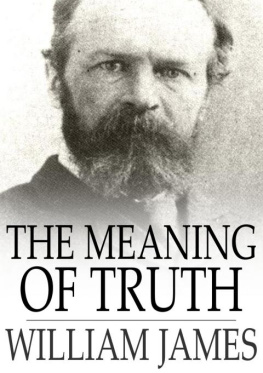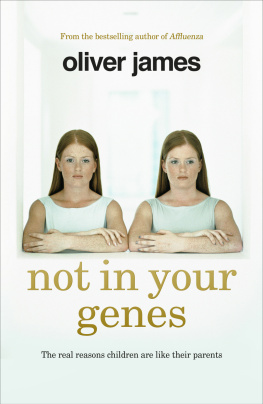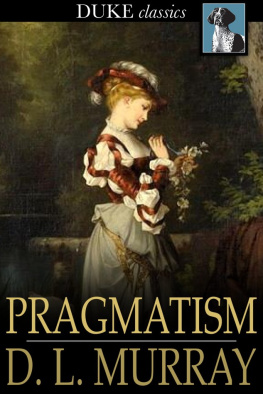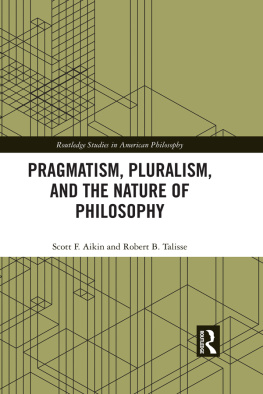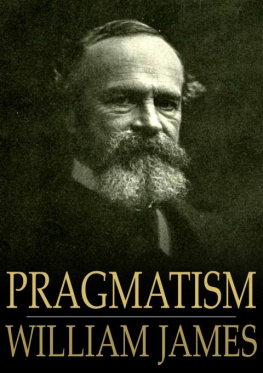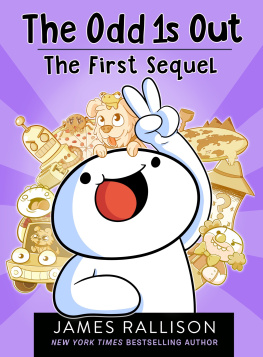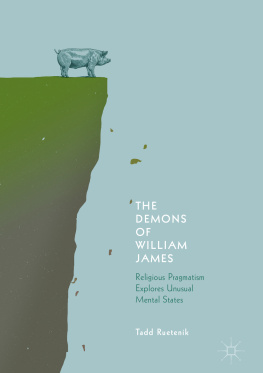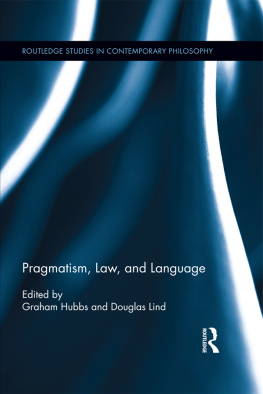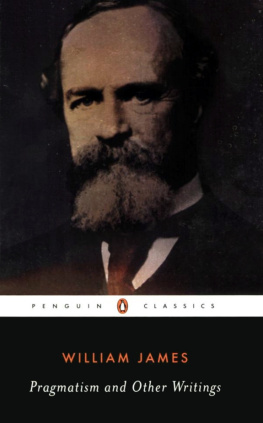James - The meaning of truth: a sequel to Pragmatism
Here you can read online James - The meaning of truth: a sequel to Pragmatism full text of the book (entire story) in english for free. Download pdf and epub, get meaning, cover and reviews about this ebook. City: Auckland;N.Z, year: 2010, publisher: The Floating Press, genre: Science. Description of the work, (preface) as well as reviews are available. Best literature library LitArk.com created for fans of good reading and offers a wide selection of genres:
Romance novel
Science fiction
Adventure
Detective
Science
History
Home and family
Prose
Art
Politics
Computer
Non-fiction
Religion
Business
Children
Humor
Choose a favorite category and find really read worthwhile books. Enjoy immersion in the world of imagination, feel the emotions of the characters or learn something new for yourself, make an fascinating discovery.
The meaning of truth: a sequel to Pragmatism: summary, description and annotation
We offer to read an annotation, description, summary or preface (depends on what the author of the book "The meaning of truth: a sequel to Pragmatism" wrote himself). If you haven't found the necessary information about the book — write in the comments, we will try to find it.
The meaning of truth: a sequel to Pragmatism — read online for free the complete book (whole text) full work
Below is the text of the book, divided by pages. System saving the place of the last page read, allows you to conveniently read the book "The meaning of truth: a sequel to Pragmatism" online for free, without having to search again every time where you left off. Put a bookmark, and you can go to the page where you finished reading at any time.
Font size:
Interval:
Bookmark:

The Meaning of Truth
A Sequel to 'Pragmatism'
First published in 1909
ISBN 978-1-775417-83-5
2010 The Floating Press
While every effort has been used to ensure the accuracy and reliability of the information contained in The Floating Press edition of this book, The Floating Press does not assume liability or responsibility for any errors or omissions in this book. The Floating Press does not accept responsibility for loss suffered as a result of reliance upon the accuracy or currency of information contained in this book. Do not use while operating a motor vehicle or heavy equipment. Many suitcases look alike.
Visit www.thefloatingpress.com
THE pivotal part of my book named Pragmatism is its account of therelation called 'truth' which may obtain between an idea(opinion, belief, statement, or what not) and its object. 'Truth,' Ithere say, 'is a property of certain of our ideas. It means theiragreement, as falsity means their disagreement, withreality. Pragmatists and intellectualists both accept thisdefinition as a matter of course.
'Where our ideas [do] not copy definitely their object, what doesagreement with that object mean? ... Pragmatism asks itsusual question. "Grant an idea or belief to be true," it says, "whatconcrete difference will its being true make in any one's actuallife? What experiences [may] be different from those which wouldobtain if the belief were false? How will the truth be realized?What, in short, is the truth's cash-value in experientialterms?" The moment pragmatism asks this question, it sees theanswer: TRUE IDEAS ARE THOSE THAT WE CAN ASSIMILATE, VALIDATE,CORROBORATE, AND VERIFY. FALSE IDEAS ARE THOSE THAT WE CANNOT. Thatis the practical difference it makes to us to have true ideas; thattherefore is the meaning of truth, for it is all that truth is knownas.
'The truth of an idea is not a stagnant property inherent in it.Truth HAPPENS to an idea. It BECOMES true, is MADE true by events.Its verity IS in fact an event, a process, the process namely of itsverifying itself, its veriFICATION. Its validity is the process ofits validATION.
'To agree in the widest sense with a reality can only mean to beguided either straight up to it or into its surroundings, or to beput into such working touch with it as to handle either it orsomething connected with it better than if we disagreed. Bettereither intellectually or practically .... Any idea that helps usto deal, whether practically or intellectually, with either thereality or its belongings, that doesn't entangle our progress infrustrations, that FITS, in fact, and adapts our life to thereality's whole setting, will agree sufficiently to meetthe requirement. It will be true of that reality.
'THE TRUE, to put it very briefly, IS ONLY THE EXPEDIENT IN THE WAYOF OUR THINKING, JUST AS THE RIGHT IS ONLY THE EXPEDIENT IN THE WAYOF OUR BEHAVING. Expedient in almost any fashion, and expedient inthe long run and on the whole, of course; for what meets expedientlyall the experience in sight won't necessarily meet all fartherexperiences equally satisfactorily. Experience, as we know, has waysof BOILING OVER, and making us correct our present formulas.'
This account of truth, following upon the similar ones given byMessrs. Dewey and Schiller, has occasioned the liveliestdiscussion. Few critics have defended it, most of them have scoutedit. It seems evident that the subject is a hard one to understand,under its apparent simplicity; and evident also, I think, thatthe definitive settlement of it will mark a turning-point in thehistory of epistemology, and consequently in that of generalphilosophy. In order to make my own thought more accessible to thosewho hereafter may have to study the question, I have collected inthe volume that follows all the work of my pen that bears directlyon the truth-question. My first statement was in 1884, in thearticle that begins the present volume. The other papers follow inthe order of their publication. Two or three appear now for thefirst time.
One of the accusations which I oftenest have had to meet is that ofmaking the truth of our religious beliefs consist in their 'feelinggood' to us, and in nothing else. I regret to have given some excusefor this charge, by the unguarded language in which, in the bookPragmatism, I spoke of the truth of the belief of certainphilosophers in the absolute. Explaining why I do not believe in theabsolute myself (p. 78), yet finding that it may secure 'moralholidays' to those who need them, and is true in so far forth (if togain moral holidays be a good), Ioffered this as a conciliatory olive-branch to my enemies. But they,as is only too common with such offerings, trampled the gift underfoot and turned and rent the giver. I had counted too much on theirgood willoh for the rarity of Christian charity under the sun! Ohfor the rarity of ordinary secular intelligence also! I had supposedit to be matter of common observation that, of two competing viewsof the universe which in all other respects are equal, but of whichthe first denies some vital human need while the second satisfiesit, the second will be favored by sane men for the simple reasonthat it makes the world seem more rational. To choose the first viewunder such circumstances would be an ascetic act, an act ofphilosophic self-denial of which no normal human being would beguilty. Using the pragmatic test of the meaning of concepts, I hadshown the concept of the absolute to MEAN nothing but theholiday giver, the banisher of cosmic fear. One's objectivedeliverance, when one says 'the absolute exists,' amounted, on myshowing, just to this, that 'some justification of a feelingof security in presence of the universe,' exists, and thatsystematically to refuse to cultivate a feeling of security would beto do violence to a tendency in one's emotional life whichmight well be respected as prophetic.
Apparently my absolutist critics fail to see the workings of theirown minds in any such picture, so all that I can do is to apologize,and take my offering back. The absolute is true in NO way then, andleast of all, by the verdict of the critics, in the way which Iassigned!
My treatment of 'God,' 'freedom,' and 'design' was similar.Reducing, by the pragmatic test, the meaning of each of theseconcepts to its positive experienceable operation, I showed them allto mean the same thing, viz., the presence of 'promise' in theworld. 'God or no God?' means 'promise or no promise?' It seems tome that the alternative is objective enough, being a question as towhether the cosmos has one character or another, even though our ownprovisional answer be made on subjective grounds. Neverthelesschristian and non-christian critics alike accuse me of summoningpeople to say 'God exists,' EVEN WHEN HE DOESN'T EXIST, becauseforsooth in my philosophy the 'truth' of the saying doesn'treally mean that he exists in any shape whatever, but only that tosay so feels good.
Most of the pragmatist and anti-pragmatist warfare is over what theword 'truth' shall be held to signify, and not over any of thefacts embodied in truth-situations; for both pragmatists and anti-pragmatists believe in existent objects, just as they believe in ourideas of them. The difference is that when the pragmatists speak oftruth, they mean exclusively some thing about the ideas, namelytheir workableness; whereas when anti-pragmatists speak of truththey seem most often to mean something about the objects. Since thepragmatist, if he agrees that an idea is 'really' true, alsoagrees to whatever it says about its object; and since most anti-pragmatists have already come round to agreeing that, if the objectexists, the idea that it does so is workable; there would seem solittle left to fight about that I might well be asked why instead ofreprinting my share in so much verbal wrangling, I do not show mysense of 'values' by burning it all up.
Font size:
Interval:
Bookmark:
Similar books «The meaning of truth: a sequel to Pragmatism»
Look at similar books to The meaning of truth: a sequel to Pragmatism. We have selected literature similar in name and meaning in the hope of providing readers with more options to find new, interesting, not yet read works.
Discussion, reviews of the book The meaning of truth: a sequel to Pragmatism and just readers' own opinions. Leave your comments, write what you think about the work, its meaning or the main characters. Specify what exactly you liked and what you didn't like, and why you think so.

